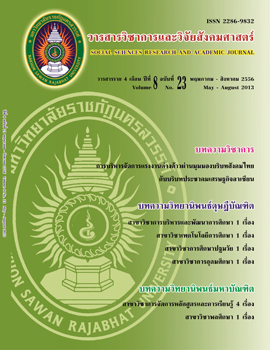ผลการจัดประสบการณ์แบบสืบเสาะหาความรู้ที่มีต่อความสามารถ ในการคิดเชิงเหตุผลของเด็กปฐมวัย
Main Article Content
Abstract
บทคัดย่อ
การวิจัยครั้งนี้ มีวัตถุประสงค์เพื่อศึกษาจำนวนของเด็กปฐมวัยที่มีคะแนนความสามารถในการคิดเชิงเหตุผลผ่านเกณฑ์ร้อยละ 75 ของคะแนนเต็ม และเพื่อเปรียบเทียบความสามารถในการคิดเชิงเหตุผลก่อนและหลังได้รับการจัดประสบการณ์แบบสืบเสาะหาความรู้ของเด็กปฐมวัย กลุ่มตัวอย่างในการวิจัยครั้งนี้ ได้แก่ เด็กปฐมวัย ที่กำลังศึกษาอยู่ในชั้นอนุบาลปีที่ 2 ภาคเรียนที่ 2 ปีการศึกษา 2555 ของโรงเรียนอนุบาลหนองบัว (เทพวิทยาคม) สำนักงานเขตพื้นที่การศึกษาประถมศึกษานครสวรรค์ เขต 3 จำนวน 1 ห้องเรียน จำนวนนักเรียน 30 คน ซึ่งได้มาจากการสุ่มแบบกลุ่ม เครื่องมือที่ใช้ในการวิจัยประกอบด้วย 1) แผนการจัดประสบการณ์แบบสืบเสาะหาความรู้มีค่าคะแนนคุณภาพเฉลี่ยเท่ากับ 4.54 และมีค่าส่วนเบี่ยงเบนมาตรฐานเท่ากับ 0.25 และ 2) แบบทดสอบวัดความสามารถในการคิดเชิงเหตุผล เป็นแบบทดสอบที่มีคำถามเป็นรูปภาพ ตัวเลือกเป็นแบบเลือกตอบ 3 ตัวเลือก จำนวน 30 ข้อ มีค่าความยากง่ายตั้งแต่ 0.2 - 0.8 และมีค่าดัชนีอำนาจการจำแนก (B) เท่ากับ 0.20 - 0.55 และมีค่าความเที่ยงเท่ากับ 0.78 วิเคราะห์ข้อมูลโดยการหาค่าเฉลี่ย ส่วนเบี่ยงเบนมาตรฐานและการทดสอบค่าทีแบบกลุ่มตัวอย่างไม่อิสระ ผลการวิจัยพบว่า
1. เด็กปฐมวัยที่ได้รับการจัดประสบการณ์แบบสืบเสาะหาความรู้มีความสามารถในการคิดเชิงเหตุผลหลังเรียนผ่านเกณฑ์ ร้อยละ 75 ของคะแนนเต็ม อย่างมีนัยสำคัญทางสถิติที่ระดับ .05
2. เด็กปฐมวัยที่ได้รับการจัดประสบการณ์แบบสืบเสาะหาความรู้มีความสามารถในการคิดเชิงเหตุผลหลังเรียนสูงกว่าก่อนเรียนอย่างมีนัยสำคัญทางสถิติที่ระดับ .05
Abstract
The purposes of this research were to study the effect of Activity Arrangement with Inquiry Technique on the Reasoning Ability of Pre–School Children based on 75 percent of full score passing criterion, and to compare the ability of logical thinking before and after receiving the inquiry learning experience of pre–school children.
The samples used in the study were 30 children of pre–school children at Anuban Nong Bua School (Tepwittayakom). The experiment was conducted during the second semester of the 2012 academic year. The research instruments used in this study were 1) Activity Arrangement with Inquiry Learning Technique on the Reasoning Ability lesson plans with average score of 4.54 and the standard deviation of 0.25, indicating being the most appropriate plan. 2) The 30 items with three multiple choice of reasoning thinking skills tests having the degree of difficulty between 0.2-0.8, the discrimination power between 0.20-0.55 and the reliability efficient of 0.78. The collected data were analyzed by mean, standard deviation and t-test for dependent sample. The research findings were as follows:
1. The pre–school children using an Activity Arrangement with Inquiry Technique on the Reasoning Ability passed the 75 percent criterion significantly at the .05 level.
2. The pre–school children using an Actirity Arrangement with Inquiry Technique on the Reasoning ability had reasoning-thinking skills after learning higher than that before learning significantly at the .05 level.


